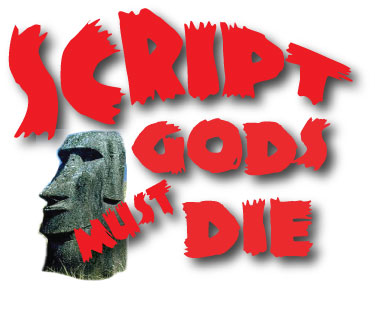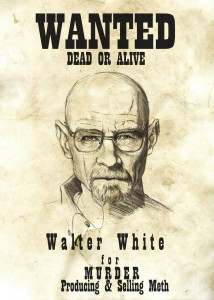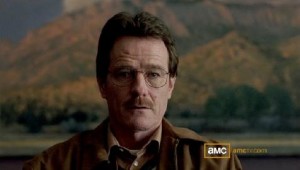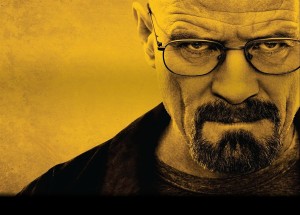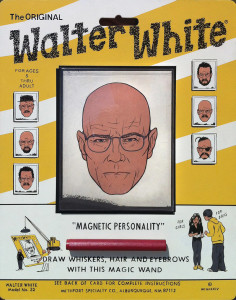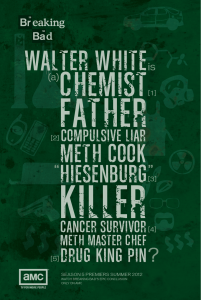SPOILERS! Yes, that’s in 16 font, folks. I don’t want to hear the whining of people who are a day late and a dollar short on their binge watching. I mean, how long are we supposed to wait for you to catch up? Hope this doesn’t spoil it, but… Rosebud? It’s a SLED!
Seriously, you know the greatness of a TV show when you have this level of fandom surrounding it. I was told that 8 of the Top 10 Pirate Bay torrents last week were the final episode of Breaking Bad (allright, so I wasn’t “told”). What do you make of this phenomenon? People talk in general terms of the originality of the story, or the look of the desert world, or the weekly murderous gore, or the great characters. Yeah, those are obvious. But let’s break it down. What about a great character like Walter White…what makes him great?
I’m like Walter White in very few ways, but one of them is a completely wonky dedication to detail. In this case, into the chemistry of character.
Most people don’t feel the need to break it down on such a level but a thorough examination is in order for you screenwriting and TV writers. Not to steal Vince Gilligan’s chops but…if you can steal Vince Gilligan’s chops, do it!
Walter White is an anti-hero. What’s that mean? It means he has heroic aspects to him, and non-heroic aspects. Yeah, duh! It means he’s…complicated. Complicated how? He’s…gray. Gray? Gray?! The fuck’s he talking about?
Character Arc: Point A: Walter White, high-school chemistry teacher, a mousy and soft-spoken fellow, has his world rocked by a cancer-diagnosis (Fate Knock #1). He doesn’t make much money and has nothing put away for his family. Walter’s primary motivation becomes the need to find money for his family, to provide for them after he’s gone. His brother-in-law, a DEA agent, casually mentions taking him along on a meth-lab bust, to spice up his dull life (Fate Knock #2). At the bust, he sees an ex-student (Jesse Pinkman) crawl out a window and fall two stories to escape the cops (Fate Knock #3). These are lynch pin moments. There is no story without them. If Walt doesn’t develop cancer, or doesn’t have a DEA agent for a brother-in-law who takes him for a ride to a meth lab, or doesn’t see Jesse tumble out that window… there is no Breaking Bad.
Character Arc: Point C: Walter is no dummy. He’s the smartest guy in any room he walks into. He puts two and two together, the $$ involved in methamphetamine production, his former student knows how to run a lab, and Walter the master of the chemistry of it. Stars in alignment. He gives Jesse every cent in he has in the world. Jesse buys an RV. They will drive it out to the desert and cook there. Walter is still rather mousy, almost an innocent. Almost. Because it’s here we see one of his great talents, if not his greatest. The man can LIE.What an amazing liar! He tells his wife all manner of BS to cover his late-night arrivals and early morning exits. This is where the complication ensues, the chemistry of the character. There is a nobility to Walter. He won’t tell his wife he’s got cancer. He’ll suffer in silence, risk his life dealing with meth-head gangbangers to raise money for his family. The Pilot starts and ends with a drug-deal going bad, he and Jessie this close to dying, Walter killing the meth-head gangstas instead. In this single hour alone, Walter White has come a loooong way from Point A, the high-school chem lab professor.
Character Arc, Point P: For the sake of space, I’ll be mashing up some plot. Walter’s wife Skylar isn’t stupid. She now knows he’s lying but doesn’t know the truth her husband has become the legendary Heisenberg. When she confronts him he continues to lie, long after she ceases to believe him. The marriage is falling apart and, oh by the way, there’s a baby on the way. The Pilot meth-head gangstas (Emilio & Krazy 8) are killed by Walt and Jesse, replaced with an even worse pyscho meth-head gangsta (Tuco Salamanca) connected to the Mexican Salamanca drug cartel. Tuco is killed too (by Hank), which brings even the worst gangsta of all, Gus Fring.
WE, the audience, see Walt in ALL these dimensions: Master meth-chef, killer, family man. In a very different sense, we’ve seen this anti-hero before. Tony Soprano had the same love of family, the same lust of money, the same merciless killer inside. How does a guy order the murder of someone he’s broken bread with for a decade, get off the phone, and routinely sit down to Sunday scallopini with his family?
This is the graying of character. The what is, and what appears to be. Juxtaposing traits that have never been combined before. Walter White has the ability to comparmentalize. He rationalizes. He analyzes and acts, calculating with devestating brutality as if it were a chemistry equation.
The chess match with Gus Fring is a classic. Fring has the not as he appears thing going too. The dude runs a string of fried chicken joints! He’s a meek, mousy, soft-spoken, bookworm of a man. He contributes to police charities, is a giving board member of the hospital, is kind and courteous to his workers, who also happens to be a major drug kingpin affiliated with the Salamanca drug cartel. He has killed, or ordered killed, dozens of men, including cutting the throat of his own second-in-command in front of Walt and Jesse. He’s a bad-ass bookworm fried chicken king! The life-and-death chess match between Walter White and Gus Fring that plays out in Season 4 of Breaking Bad is some of the greatest drama theater in the history of television.
Character Arc, Point X: By season 4, according to the Breaking Bad Wiki: “Walt is initially squeamish about the use of violence but gradually comes to see it as a necessity. He also comes to find his new status as a drug lord psychologically rewarding, leading him to become less and less reluctant to resort to criminal acts such as theft, extortion, money laundering, depraved indifference, and murder. Walt’s Macbethian descent into the criminal underworld unearths immense levels of deeply repressed ambition, rage, resentment, vanity, and an increasing ruthlessness which alienates him from his family and colleagues.”
When you hear people talk about character arc, they’re talking about the character’s journey through the course of the movie/TV show. Character change is the journey. Television by its episodic nature plays out over a multi-week period, allowing for greater character depth/arc if only for the sheer amount of time given. A lot easier to play out A to Z in TV’s 16 hours than the 90 minutes of a movie.
In Season 4, to quote Walt himself: “You clearly don’t know who you’re talking to, so let me clue you in. I am not in danger, Skylar. I am the danger.” The high-school chemistry professor we knew at Character Point A, is gone. When Gus Fring stumbles out of Hector Salamanca’s room with half his face blown off, we believe Walt when he tells Skylar: “I won.”
Character Arc, Point Z: Season 5, how to end it? How to tie everything together? Can you imagine being in the writer’s room, knowing the millions of people are hinged on your every decision?! I’ve seen some criticism of the Final Episode. People wanted it less pat, they wanted it all to be a figment of a dying Walt’s imagination (Brazil/Mulholland Drive-style). Put your head in mind of Gilligan. If you expect me to do A then I’ll do B but B is morally impossible and will be despised (say, allowing the Nazis to live) so we’ll have to do A, but NOT THE WAY THEY EXPECT IT. The final episode was a structural marvel, not a wasted scene or moment. Call it a guilty pleasure or obviousness but I ENJOYED him wrapping up the loose ends. Walt, the supreme anti-hero, smartest guy in the room, wins again. Even in the engineering of his own death. Elegance, bloody elegance.
